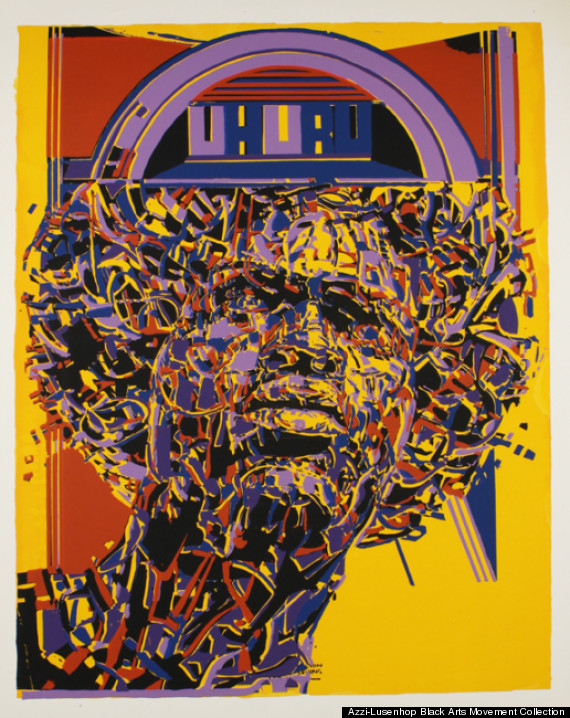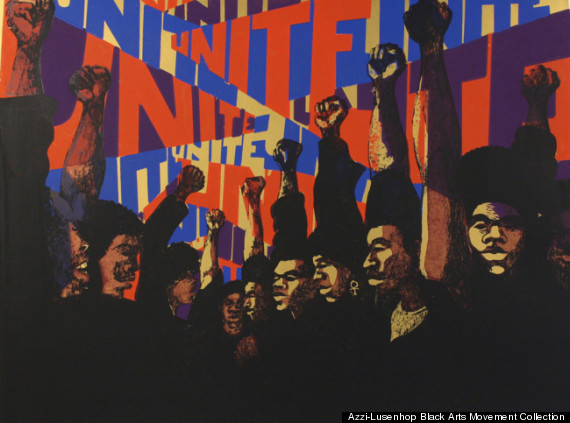A new art show and run of films set to screen at the Cass City Cinema will offer Detroiters a fresh and much-needed second look at the city's last half-century. The exhibit, "Black Power Prints of AfriCOBRA," and the film, "The Black Power Mixtape 1967-1974," invite visitors to examine the relationship between the Black Power movement and the Civil Rights struggle.
As a whole, the weekend-long event offers a great opportunity to reflect on the role of the Black Power movement in Detroit. It's a legacy that's often conspicuously absent from the the narratives now being spun about Detroit's desolation and its rebirth.
"I think in Detroit we talk very much in hushed tones about the past. The [1967] riots still define the history of the city, or the beginning of the 'decline,'" said art dealer David Lusenhop, who organized the show of AfriCOBRA's black political art to display alongside the theater's film offerings.
AfriCOBRA stands for "African Commune of Bad Relevant Artists." The still-active artists collective originally came together to create Chicago's famous "Wall of Respect" mural in 1967. According to Lusenhop, the group's works were among the first of the era to promote a pro-black aesthetic.
That message "specifically spoke to the African-American community and, as they understood it, the larger black nation, the larger black diaspora," Lusenhop said. "Their interest was to be be a very pro-black group -- self-directed. They famously said they wanted to make art for people and not for critics."
Some of the AfriCOBRA works in the Cass City Cinema show can be found online, but they take on a different reality up close and in person. The effect is engaging and draws a viewer in with a vibrant intensity.

Nelson Stevens. "Uhuru" 1971, screenprint on paper. Courtesy of the Azzi-Lusenhop Black Arts Movement Collection.
Screen prints are colored in a bright fluorescent palette termed "cool-aid" colors. Each of the works feels upbeat and triumphant, and many have words worked almost subliminally into the texture of the composition. They feature a variety of titled themes explicitly addressing African Americans of the era: "Wake Up," "Relate To Your Heritage," "Uphold Your Men."

Barbara Jones-Hogu. "Unite" 1971, screenprint on paper. Courtesy of the Azzi-Lusenhop Black Arts Movement Collection.
"What this group was about was countering so many of those popular culture and media forces that the black community was not a vibrant, safe, thriving place," said Lusenhop. "There have been great stories of success, and AfriCOBRA's work speaks directly to that time."
On the film side, Cass City Cinema proprietor Joel Landy is looking forward to screening both "The Black Power Mixtape," a recent Swedish historical documentary, and "The Time," a 20 minute contemporary short film about interracial romance.
"The Black Power Mixtape" uses recovered 16mm film footage found in the cellar of a Swedish Television network to explore the development of the Black Power movement. Director Goran Hugo Olsson assembled the documentary clips into a 100-minute collage spliced with contemporary audio commentary from a number of prominent African-American artists, activists, musicians and scholars.
Landy said he feels a personal connection to many of the themes explored in the film. In the late '60s, he moved to Chicago to work on the Chicago Seven conspiracy trial and get involved in politics. He was working in a Chicago print shop when Black Panthers Mark Clark and Fred Hampton were killed.
"When I saw this movie, I felt it was my history," he said. "Even though I'm not black, I felt it was part of my history, too."
For a more contemporary view, local director Shawntay Dalon's movie "The Time," explores how interracial relationships have changed since the 1960s. The 26-year-old African-American filmmaker said her movie was inspired by her friendships with people of many different backgrounds.
"I always wanted to do a piece to show not just the black side of it, but to show how we all [have] grown," she said.
Dalon filmed the short last January at a Livonia hotel and has been screening it at local schools for Black History Month.
Screening the old documentary footage alongside Dalon's newer movie has allowed for some interesting comparisons and conversations. Thursday night's opening show drew a diverse crowd. Its members included those unfamiliar with the specifics of the Black Power movement, as well as several who had participated in many of the struggles documented in "The Black Power Mixtape."
Ellis McCaskill, a young African-American actor who starred in "The Time," found the Swedish documentary very informative.
"I got a chance to learn about some people I didn't even know about: Angela Davis and Eldridge Cleaver and Bobby Seale and Huey Newton," he said.
Kim Green and Kevin Carey, local African-American activists who work with the Detroit People's Task Force, said they both really enjoyed the documentary.
"I've never seen an interview with Elaine Brown before, and not too many with Angela Davis either," Green said. "It was kind of fresh to see the whole thing, and I kind of like the way he did it with the mixtape going year by year," a reference to the film's musical score.
Carey said the movie reminded him of his youth. He found its examination of illegal drugs' effect on Black Power movement particularly instructive.
"That stuff came into the community, and all this stuff about revolution, fighting the system, fighting capitalism eroded," he said.
Viewers found the combination of both films with the political art exhibit speak not only to black history, but to a contemporary reality.
Carey said he felt most of the problems explored in "The Black Power Mixtape" persist in African-American communities. Sue Hamilton-Smith, a retired white social worker who attended the opening, agreed.
"All of the conditions that happened there in the early '60s are happening again," she said, noting the prevalence of poverty, inadequate education and drugs. "It's very sad to see that 50 years later we've come full circle."
The Cass City Cinema events run from Feb. 9 -12. The AfriCOBRA art exhibit is free and open to the public. Tickets for the films are $5. The Cass City Cinema is located at the Burton Theater, 3420 Cass Avenue in Detroit. For show times see the theater's website.
CORRECTION: An earlier version of this story misidentified the two images above. The captions have been fixed to reflect the correct information.